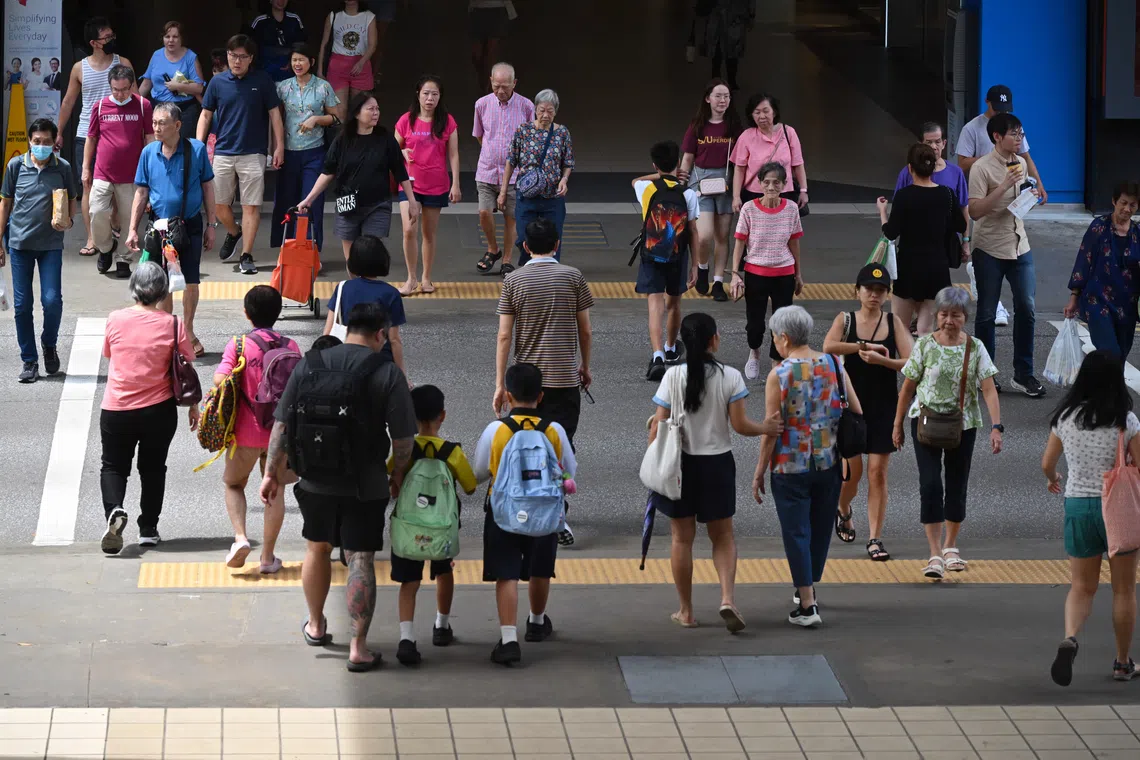New government initiatives aiming to create a fairer society, improve lives for all Singaporeans
Sign up now: Get ST's newsletters delivered to your inbox

A slew of initiatives aimed at building a fairer and more inclusive society for Singaporeans will be rolled out.
ST PHOTO: KUA CHEE SIONG
Follow topic:
- Government initiatives will support Singaporeans through life stages, focusing on youth, families, vulnerable groups, and seniors, amidst an ageing population.
- Healthcare will shift to community-based care with increased hospital and nursing home beds, leveraging AI for better services and preventive care under Healthier SG.
- Education focuses on lifelong learning, AI readiness, and reduced academic emphasis, with support for diverse needs and parent-teacher collaboration for well-being.
AI generated
SINGAPORE – To build a society that supports Singaporeans at every stage in life, the Government said on Sept 17 that it would nurture youth, do more for families, support the vulnerable and care for seniors.
A slew of initiatives aimed at building a fairer and more inclusive society for Singaporeans will be rolled out, ensuring that everyone has access to the opportunities to lead better lives as the country rapidly ages
To this end, the Ministry of Health, Ministry of Social and Family Development and Ministry of Education outlined their initiatives on Sept 17 in their addenda to President Tharman Shanmugaratnam’s address
On Sept 5, Mr Tharman spoke about the importance of having comprehensive social support systems in place to ensure fairer outcomes, through helping Singaporeans sustain social mobility and navigate challenging and uncertain times.
Here are the highlights from the various addenda or public statements of the strategies:
Ministry of Health (MOH)
To ensure that healthcare remains of high quality, accessible and affordable, MOH is shifting the delivery of care away from acute hospitals to the community, especially for preventive care and population health, said Health Minister Ong Ye Kung.
To meet the growing demands of an ageing population, MOH will add 2,800 hospital beds by 2030, with the new Eastern General Hospital and redeveloped Alexandra Hospital. Beyond that, more beds will come when the planned hospital in Tengah is up and both the Singapore General Hospital and National University Hospital campuses are redeveloped. Six new polyclinics and 10,000 nursing home beds will also be added by 2030.
Not only will healthcare manpower be boosted by another 20 per cent by 2030, MOH will also enable nurses and allied health professionals to go on modular work-study training pathways to broaden and deepen the expertise of the healthcare workforce.
Family medicine will be formalised as a speciality, given its growing importance in Singapore’s population health approach.
Acute hospitals will adopt a more holistic and patient-centred model by consolidating care across various specialist teams, said Mr Ong.
MOH will leverage artificial intelligence (AI). It will make imaging AI a national capability in public healthcare by end-2026, launch an AI assistant on the consolidated HealthHub app, and progressively introduce AI for predictive and preventive care to help delay or prevent the onset of serious illnesses. It will also deepen research in genomics and introduce more cost-effective precision medicine therapies.
MOH’s plans to enhance population health include expanding
national health promotion strategy Grow Well SG
to help young people build healthier habits and reduce health risks, prioritising youth mental health and rigorously enforcing the vaping ban.Over 1.3 million residents have enrolled in Singapore’s
preventive care programme Healthier SG
. MOH said it will better support enrollees to fulfil their health plans and expand coverage for mental health conditions.As for the seniors, it will help them age actively within the community through Age Well SG, with more active ageing centres, better coordinated community-based care support, and public hospitals’ community health posts. Existing housing estates will be transformed
into Age Well Neighbourhoods
to support seniors who prefer to age at home.To ensure that healthcare remains affordable, MOH will continue to review the S+3M system (Subsidies, MediSave, MediShield Life and MediFund). In particular, its schemes must help anchor care in the community by strengthening the role of the general practitioners in enhancing population health and looking after chronic patients in the community, said Mr Ong.
MOH will address the significant wastage and cost escalation in private healthcare, which has been made worse by overly generous health insurance policies.
Ministry of Social and Family Development (MSF)
To support families through every stage of life, MSF will ensure that all children have access to affordable and quality early childhood services, support caregivers in caring for their loved ones while helping them remain in or return to the workforce, as well as develop accessible and affordable family counselling services, said Minister for Social and Family Development Masagos Zulkifli.
MSF will review the Mental Capacity Act to better support families with vulnerable adults, and strengthen safeguards against misuse or abuse of the lasting powers of attorney.
It will also enhance home-based, community and employment support, as well as expand lifelong learning opportunities, to enable people with disabilities to live and participate fully in the community.
Lower-income families can gain stability, self-reliance and social mobility through expanded support under
ComLink+, a scheme that aims to uplift these families with children
. Those with young children will get help to enrol them in pre-schools.It will strengthen the legal framework for protecting survivors of domestic violence through a new Domestic Violence Act.
MSF also said that it will review the family services landscape to deliver services in a more holistic and family-focused manner and ensure stronger outcomes for families with complex issues.
To develop a strong and future-ready social sector, MSF will offer support to help retain social service professionals as well as encourage the pervasive adoption of technology, including AI, to enhance social services. It will also promote philanthropic efforts.
Ministry of Education (MOE)
Minister for Education Desmond Lee wants to equip and empower Singaporeans to embrace learning for life and excel in a future shaped by AI advancements.
MOE has reduced the overemphasis on academic results and wants to help students embrace learning beyond grades. It will also strengthen support for students’ social-emotional development and well-being by working with parents and stakeholders through Grow Well SG to encourage healthy habits and support mental wellness.
It will ensure all schools remain open to students from all backgrounds and create more opportunities for interaction. Support for students with different strengths and needs will be enhanced, with more opportunities for students to pursue mother tongue language at a higher level in secondary school, for instance.
Children from families with complex needs will receive more support for their learning and well-being. MOE will continue to support students with special education needs, including helping them to transition smoothly into employment or community pathways after completing their education. For example, the Institute of Technical Education and SG Enable will work with companies to enhance internship and employment support programmes for such students, said Mr Lee.
To ready Singapore for an AI-transformed future, students will learn how to use AI responsibly and develop the skills needed for an AI-driven workplace. Clear guidelines will ensure that AI serves as a tool to enhance learning, rather than detract from it. MOE will also equip students with critical skills such as problem-solving, critical thinking and interpersonal skills, so that they can contribute value beyond the capabilities of AI.
Educators will be trained to use AI meaningfully and guide students effectively, while SkillsFuture Singapore – which celebrates its 10th anniversary in 2025 – will raise AI literacy broadly to help workers become confident AI users. A whole-of-society effort involving individuals, employers and training providers will be needed to take SkillsFuture further and meet industry needs.
To support lifelong learning, MOE will strengthen the quality and industry relevance of training, expand upskilling and reskilling pathways, and uplift the professional standards of adult educators.
Mr Lee said a strong education system requires collective effort. With parents as key partners, MOE will build on the
Guidelines for School-Home Partnerships
and the Parenting for Wellness initiative to strengthen how parents and teachers work together to support children’s mental health and emotional resilience, especially in the digital age.


